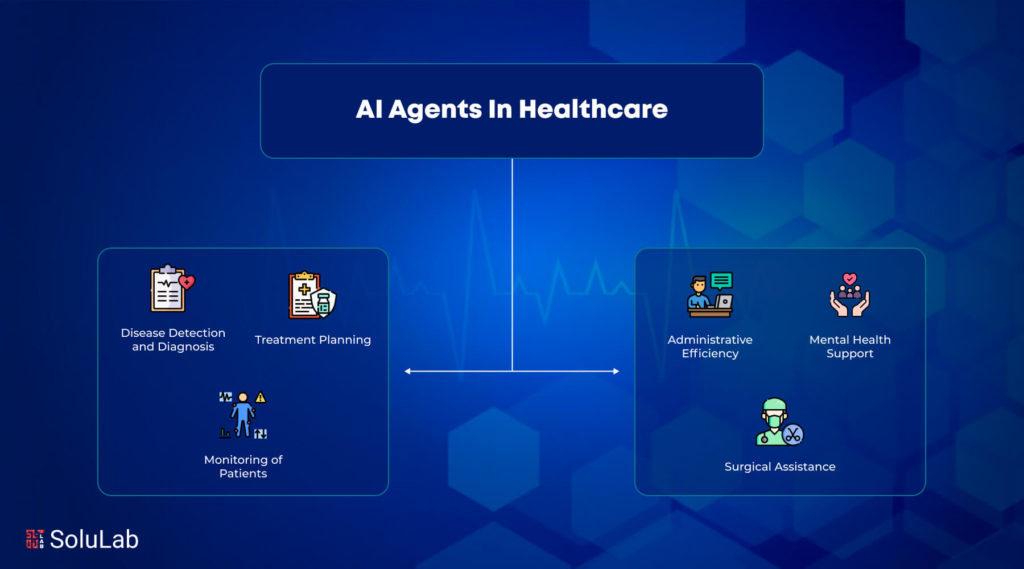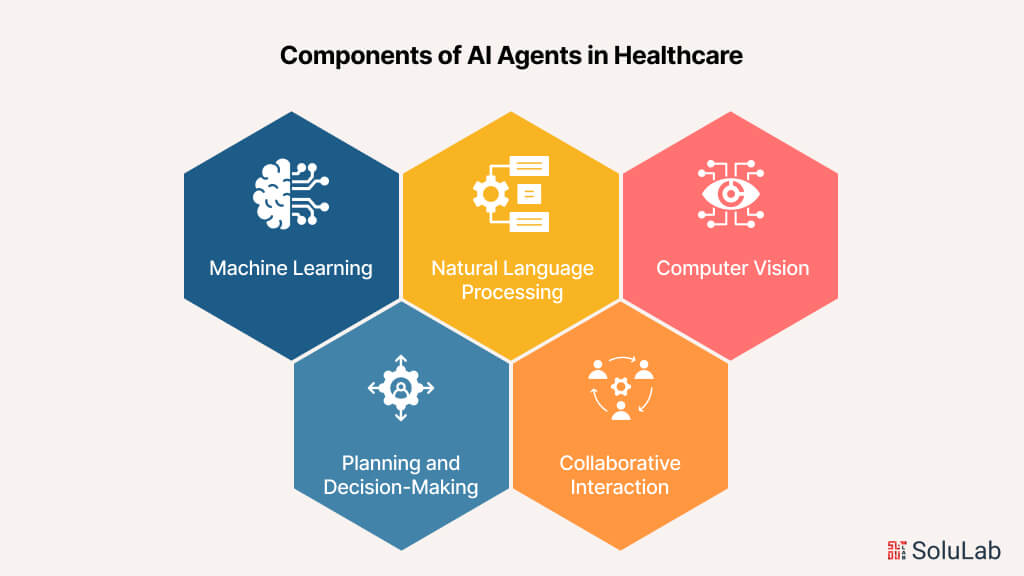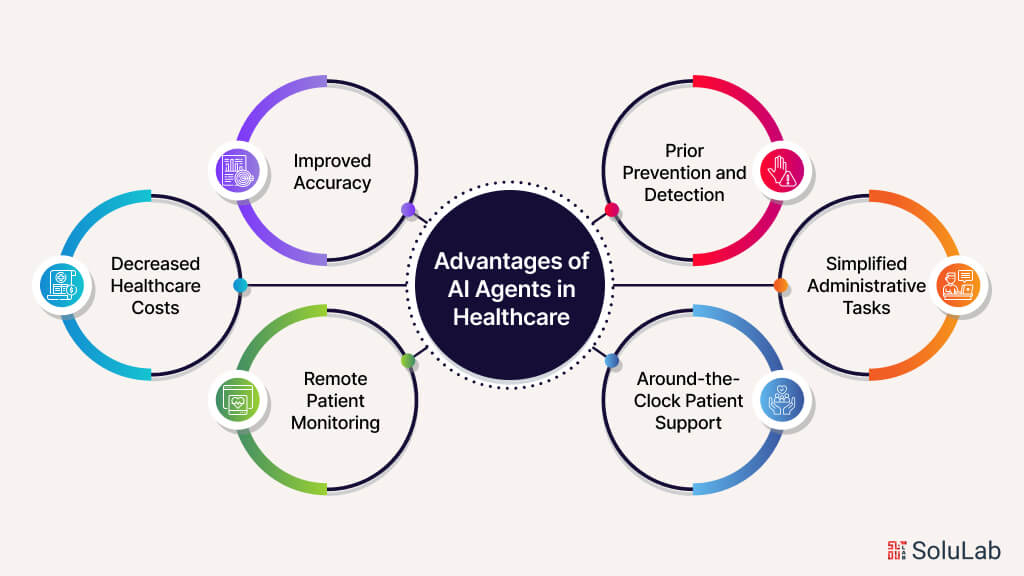
When you hear healthcare, doctors are the first thought on your mind, right? But what if you learn that AI agents are entering the healthcare sector?
Yes… AI agents in healthcare have been transforming today’s dynamic environment collaboratively with humans. These AI-powered virtual assistants help doctors diagnose diseases, streamline hospital operations, provide 24/7 patient support, and much more.
With machine learning (ML) and natural language processing (NLP), these intelligent systems are reducing human errors while improving treatment accuracy. AI agents are all set to play a crucial role in delivering personalized, data-driven healthcare solutions that benefit both providers and patients.
In this blog, there is everything you need to know about AI Agents in healthcare from its applications, key components, and benefits to the future.
What are AI Agents in Healthcare?
AI agents are working on transforming the healthcare sector by taking up multiple roles from form consulting to doctors with diagnoses and treatments for more personalized support towards every patient. They act as intelligent software that works by studying loads of data, identifying the patterns, predicting any health risks, improving early intervention, and providing more effective treatment strategies.
Apart from diagnosis and treatment, AI agents in healthcare also play a pivotal role in taking care of patients and providing support. They can easily offer personalized information and answers to questions about their conditions. Going through patient records, genetic information, and medical images is easier for AI-powered healthcare agents allowing doctors to make more informed decisions.
AI chatbots are available 24/7 to give people access to medical advice, reduce the burden on healthcare professionals, and increase patient satisfaction. These agents possess the ability to remotely monitor patient health and detect possible risks early to alert when medical attention is required.
Key Statistics on Artificial Intelligence in Healthcare
Market Growth: The global AI in healthcare market is projected to reach $188 billion by 2030, growing at a CAGR of 37% from 2022 to 2030.
Adoption: Around 20% of healthcare organizations have already integrated AI models, and 90% of hospitals are expected to use AI for early diagnosis and remote patient monitoring by 2025.
Efficiency: AI has helped reduce 20% of physicians’ time spent on administrative tasks and is estimated to save healthcare organizations $3.6 billion worldwide through AI-driven chatbots.
Regional Impact: North America dominates the AI healthcare market with a 59.1% market share, while the European Union is the second-highest contributor, expected to generate $50.24 billion by 2028.
AI in Medical Advancements: AI-powered tools successfully detected 68% of COVID-19 cases that were misdiagnosed as negative, and AI played a crucial role in helping Moderna optimize its COVID-19 vaccine.
Core Elements of AI Agents in Healthcare

AI agents are transforming healthcare through various functions like improving diagnosis, personalizing care, and automating tasks. Here are key components of agent artificial intelligence that help with its functioning:
-
Machine Learning
AI agents work on the information they are trained with using patient records and medical images which helps them with identifying patterns to predict outcomes. The application of AI agents also allows them to personalize treatment, detect any early or existing disease, and predict possible risk factors.
-
Natural Language Processing
Natural Language Processing(NLP) enables AI agents to develop a better understanding and interpret human-like language. This allows them to analyze patient queries, take out information from medical records, and even generate reports accurately.
-
Computer Vision
AI agents can easily understand and even interpret medical images such as X-rays and other concerned scans, the benefits of AI agents in healthcare are better analyzing diseases at an early stage, identifying tumors, and also assist surgeons during procedures.
-
Planning and Decision-Making
AI agents in healthcare can analyze data and make decisions according to their knowledge about the environment and the patient. This helps them in recommending treatments, predicting potential complications, and planning a regime of patient care.
-
Collaborative Interaction
AI agent in healthcare is designed to interact with humans in a user-friendly way. This will help in providing clear explanations, responding to questions, and adapting to individual user preferences.
Applications of AI Agents in Healthcare
AI Agents powered by machine learning, natural language processing, and computer vision are being deployed in healthcare domains. Take a look at the application of AI agents in healthcare:
-
Disease Detection and Diagnosis
The ability of AI-powered healthcare agents to read medical images like X-rays, mammograms, and MRIs to detect any abnormality possible at the earliest to improve survival rates and treatment outcomes. AI agents can also analyze patient data, medical history, symptoms, and genetic information to provide diagnosis based on patient history.
-
Treatment Planning
AI agents in healthcare algorithms can understand patient data and medical history to create personalized treatment plans that are tailored according to the patient’s needs and risks associated with health with the procedure. AI can also accelerate discovery by identifying potential drug candidates, predicting drug efficacy, and even optimizing drug development processes.
-
Monitoring of Patients
Another application of AI agents is seen in managing and monitoring patients via AI wearables such as sensors. Using sensors vital signs, activity levels, and medication adherence in a patient can easily be monitored, enabling remote patient care and intervention at times.
-
Administrative Efficiency
AI agents in healthcare play an important role in automating medical billing and coding processes, lowering administrative burdens, and increasing efficiency. This enables AI-powered healthcare agents to optimize appointment scheduling, reduce wait times, and enhance patient experiences.
-
Medical Research and Development
It is easier for AI bots to examine vast amounts of data from medical records and research articles than it is for humans, which aids in spotting trends and developing insights that could lead to therapeutic discoveries. AI agents in healthcare can assist with clinical trial design and recruiting, hence expediting the development of new medicines.
-
Personalized Medicine
AI agents in healthcare have been used to identify genetic predispositions, predict drug responses, and tailor treatment according to patient data. This personalized approach can result in the improvement of treatment effectiveness and reduction of possible side effects.
-
Mental Health Support
Another essential use of AI-powered healthcare agents is chatbots or virtual assistants. They are involved to help with mental health issues some may face and provide support for the same. Resources and support are made accessible to patients as a necessary care. It can also read data to know if the patient has required mental health support in the past and provide early intervention.
Related: Chatbots in Healthcare
-
Surgical Assistance
AI-powered systems can assist surgeons in performing complex procedures with precision and accuracy. It can also use real-time data during the surgery to provide support and guidance to surgeons.
Advantages of Using AI Agents in Healthcare

AI agents in healthcare are of many uses from disease detection to surgical assistance. Here are some benefits of aI agents in healthcare:
-
Improved Accuracy
With the use of AI agents in healthcare analyzing vast amounts of data at once has become much easier with greater speed and accuracy than humans ever could. This not only results in leading to more precise diagnoses but also better treatment plans and predictions.
-
Prior Prevention and Detection
AI agents can identify health risks at a much faster pace, you can think of it as AI agents can sense the disease. This allows timely treatment and interventions to prevent or cure the disease.
-
Simplified Administrative Tasks
Many of the tasks that healthcare workers have to perform can be done by AI agents to free the workers’ time. Allows them to allocate more of their time to other essential activities such as diagnosing and treating patients, this could help to enhance healthcare services
-
Around-the-Clock Patient Support
Chatbots can schedule appointments, direct tens of patients to relevant information, and give simple medical advice. Thus, patient satisfaction might be increased since patients are more engaged and prepared for their health conditions.
Read Our Blog: Top Use Cases Of AI Agents
-
Remote Patient Monitoring
Using big data analysis, AI agents can look for signs that the patient is in decline, or that they are experiencing some health issues. This is beneficial to patients who have undergone surgery since they can be constantly monitored remotely thus actions taken timely.
-
Decreased Healthcare Costs
With the help of AI agents, total expenses for healthcare can be significantly reduced due to improved performance, reduced prevalence of errors, and earlier diagnosis of illnesses. Through automation, early identification of costly issues can prevent their growth when solutions are implemented on time.
How to Build an AI Agent for Healthcare?
Building an AI agent for healthcare necessitates a well-structured approach that incorporates the most recent advances in artificial intelligence, machine learning, and healthcare technology. The following are the essential phases in creating an efficient AI-powered healthcare agent.
Step 1. Define the Purpose and Use Case
Before development begins, it’s crucial to identify the specific problem the AI agent will solve. Some common use cases include:
- Virtual health assistants for patient engagement
- AI-powered diagnostics and disease detection
- Automated administrative support (billing, scheduling, etc.)
- Personalized treatment recommendations based on patient history
Step 2. Gather and Process Medical Data
AI agents require large amounts of high-quality healthcare data to function effectively. This includes:
- Electronic Health Records (EHRs)
- Medical imaging data (X-rays, MRIs, CT scans)
- Genomic and clinical trial data
- Real-time patient monitoring data from wearables and IoT devices
Data preprocessing, cleaning, and anonymization are essential to comply with regulations like HIPAA and GDPR while ensuring accuracy.
Step 3. Choose the Right AI Model and Algorithms
The choice of AI model depends on the agent’s intended function:
- Machine Learning (ML) for predictive analytics for patient outcomes
- Natural Language Processing (NLP) for chatbots and voice assistants
- Computer Vision for medical image analysis for disease detection
- Deep Learning for drug discovery and precision medicine
Popular frameworks like TensorFlow, PyTorch, and Scikit-learn help develop robust AI models for healthcare applications.
Step 4. Train and Test the AI Model
The AI agent must be trained using labeled healthcare datasets. This involves:
- Supervised Learning: Training with annotated medical images or patient records
- Unsupervised Learning: Identifying hidden patterns in patient data
- Reinforcement Learning: Improving decision-making in real-world scenarios
The model is then validated and tested against real-world medical cases to ensure accuracy and reliability.
Step 5. Ensure Compliance and Security
Since healthcare data is sensitive, the AI agent must adhere to strict security and compliance protocols, including:
- HIPAA (Health Insurance Portability and Accountability Act)
- GDPR (General Data Protection Regulation)
- FDA and CE approvals for AI-powered medical devices
Data encryption, access control, and ethical AI principles must be implemented to ensure trust and security.
Step 6. Deploy and Integrate with Healthcare Systems
Once tested, the AI agent is deployed and integrated into existing healthcare IT infrastructures, such as:
- Electronic Health Record (EHR) systems
- Telemedicine platforms
- Hospital management software
- Wearable health monitoring devices
Cloud-based and edge AI solutions ensure scalability, allowing healthcare providers to implement AI seamlessly across different locations.
Future of AI Agents in Healthcare
With time, AI technology will undergo more advancements which raises the possibility that we will have increasingly sophisticated bots capable of handling challenging tasks in the near future. There will be AI bots that can converse with patients and adjust to achieve the best possible results—all while analyzing data about the patient.
Artificial intelligence in drug discovery has the potential to revolutionize the world on a scale never seen before, allowing new life-saving treatments to be developed faster. It can also improve the process of approaching health identity by allowing agents to deliver concrete, specific treatment options based on a person’s genetic profile, habits, and medical history. Overall, it is up to AI agents to transform the healthcare sector in a way that is proactive, preventative, and patient-centered.
The most efficient method of fostering trust between AI and doctors is through the transparency of AI healthcare agents’ decision-making and their dependency. This will further provide the groundwork for a future in which artificial intelligence will assist doctors in providing high-quality treatment to patients.
The Final Word
AI agents are no longer just futuristic concepts—they are actively transforming healthcare by improving diagnostics, optimizing operations, and enhancing patient care. But to create an endurable AI agent, it is necessary to spend a lot of time on preparation and to follow moral principles.
SoluLab, a trusted AI agent development company, specializes in creating intelligent healthcare AI solutions that meet your business needs. Whether you’re looking to develop AI-driven diagnostics, automate administrative tasks, or enhance patient engagement with AI chatbots, our experts ensure holistic development with compliance and security at the core.
SoluLab was approached by a mental health non-profit organization to create a chatbot-powered platform that may offer mental health assistance services. With that people with limited digital literacy can now receive mental health support services. If you have a similar business idea, our team of experts is always ready to render the best solutions possible. Get in touch with us now!
FAQs
1. What can be achieved for AI agents in healthcare?
AI agents in the healthcare industry are capable of many different jobs including Scheduling appointments and regulating re-fill, frequently asked medical questions, general health information, patient health records are updated and personal advice to different patients and adding value to the work of physicians, for example, in treatment and data processing.
2. Is the usage of AI agents liberated for the application in the medical field?
In the context of AI in the healthcare industry, the issues of data security and privacy are paramount. AL agents are designed to be secure; nonetheless, it is advisable to choose a solution from a trustworthy supplier who prioritizes such aspects.
3. In what ways does the patient experience improve with the introduction of AI agents?
AI agents offer consulting and support 24/7. They can schedule appointments, reply to inquiries, and remind a patient about the prescription, which means that getting healthcare is even more manageable and can be proactive.
4. Will AI agents be able to provide emotional support someday?
Still, it is challenging to offer profound spiritual support even though AI agents are always in the process of evolution. However, the AI language algorithms can determine language features and simple ideas of how to provide emotional support such as writing down one’s feelings or recommending certain thoughts.
5. How can Solulab help with AI Agents?
Solulab will help you integrate AI agents into your healthcare practice if you so wish. Our areas of specialization are the development of AI agents to ensure that they meet all the planned and expected needs of a client who has contracted out for a service at a certain specification, combined with current systems integration with other applications and systems and your electronic health records, and effective management of the increasing patient records and protection from loss, misuse, and unauthorized access.





